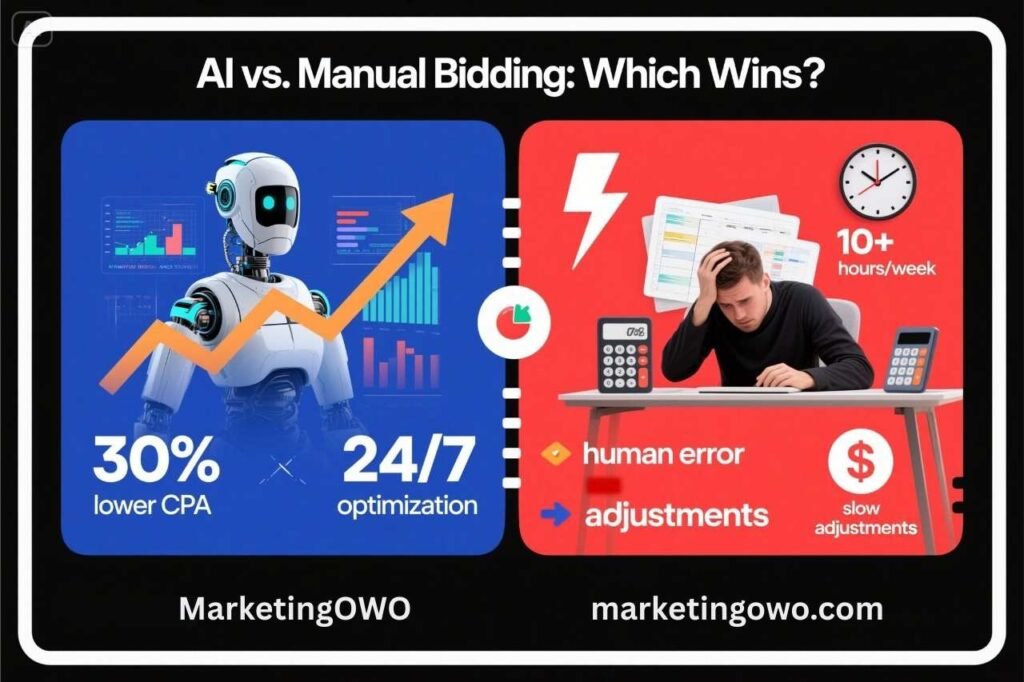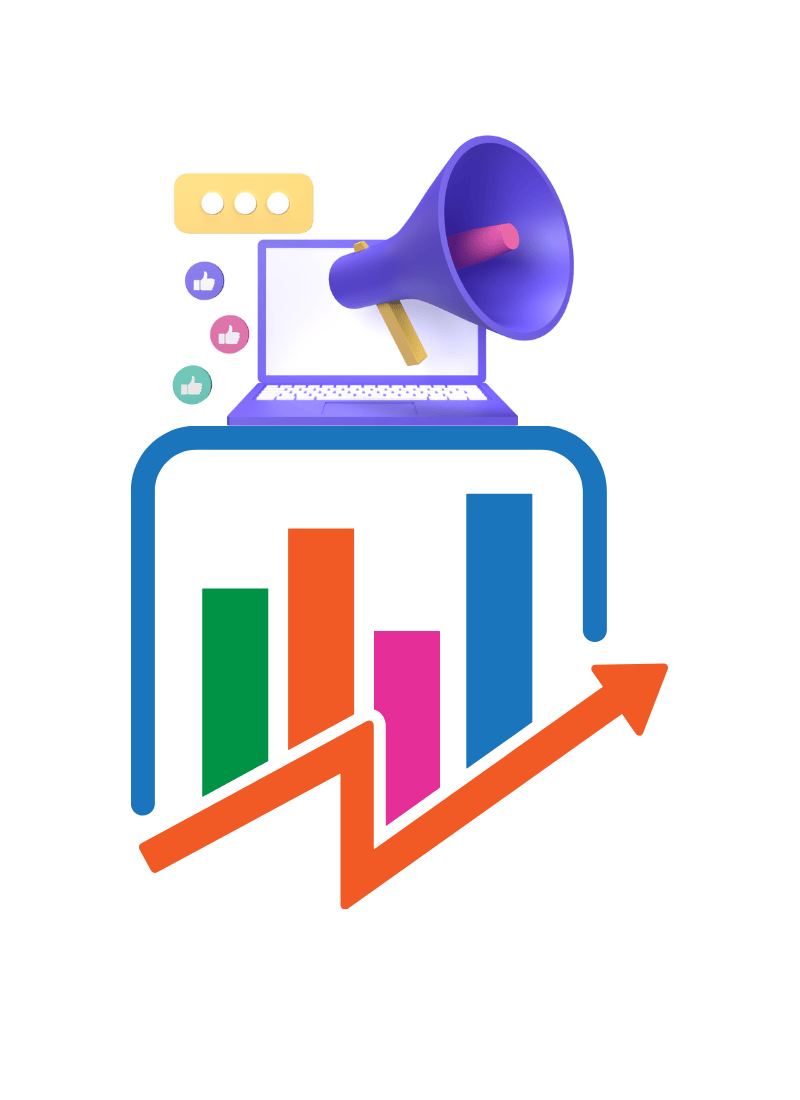PPC bid management is no longer a manual guessing game. AI tools now automate bidding, analyze data in real time, and predict outcomes—saving time and boosting ROI. In this guide, you’ll learn how AI transforms PPC campaigns, the top tools to use, and actionable steps to implement them effectively.
What Is AI-Driven PPC Bid Management?
AI-driven PPC bid management uses machine learning algorithms to adjust bids dynamically based on factors like user behavior, competition, and conversion likelihood. Unlike manual bidding, AI processes billions of data points to make decisions in milliseconds.
Why AI Outperforms Manual Bidding
- Real-Time Adjustments: React to auction dynamics instantly.
- Predictive Analytics: Forecast clicks, conversions, and costs.
- Scalability: Manage thousands of keywords effortlessly.
Google’s Smart Bidding, for example, increased conversion rates by 20% for advertisers using Target CPA (Cost Per Acquisition).

Top 3 Benefits of AI for PPC Bid Management
1. Precision Targeting with Machine Learning
AI tools analyze historical and real-time data to target high-value audiences. For instance, Optmyzr uses AI to identify underperforming keywords and reallocates budgets to top converters.
2. Cost Efficiency and Higher ROI
A 2023 SEMrush study found brands using AI bidding saw a 30% lower CPA and 25% higher ROAS compared to manual strategies. Tools like Microsoft Advertising’s AI automatically adjust bids to maximize returns within budget limits.
3. Time Savings and Reduced Human Error
Automating bid management frees up 10+ hours weekly for strategizing. AI also minimizes errors—like overbidding on low-intent keywords—common in manual setups.
5 Leading AI Tools for PPC Bid Management (Compared)
| Tool | Key Features | Best For | Platform Support |
|---|---|---|---|
| Google Smart Bidding | Target ROAS, CPA, Maximize Conversions | Google Ads users | Google Ads |
| Optmyzr | Rule-based automation, A/B testing | Multi-platform campaigns | Google, Microsoft, FB |
| MarinOne | Cross-channel optimization, Budget pacing | Enterprise-level teams | Google, FB, TikTok |
| WordStream | Performance grading, Automated recommendations | Small businesses | Google, Microsoft |
| Kenshoo | Predictive budget allocation, AI forecasts | E-commerce brands | Google, FB, Amazon |
[Case Study]: An e-commerce brand using Kenshoo achieved a 40% increase in ROAS by leveraging AI-driven seasonal budget adjustments.
How to Implement AI Tools: A 6-Step Framework
Step 1: Define Campaign Goals
Align AI settings with objectives—whether maximizing conversions, clicks, or ROAS.
Step 2: Choose the Right Tool
Match tools to your needs (e.g., Google Smart Bidding for simplicity, MarinOne for cross-channel complexity).
Step 3: Feed Clean Data
AI thrives on quality data. Audit your account for inconsistencies in tracking or conversions.
Step 4: Start with Hybrid Bidding
Combine AI suggestions with manual oversight. For example, use Optmyzr’s rules to cap bids on high-cost keywords.
Step 5: Monitor and Optimize
Review AI performance weekly. Adjust targets or exclude underperforming segments.
Step 6: Scale Successes
Double down on winning strategies. One agency scaled a client’s campaign by 200% without increasing CPA using MarinOne’s predictive budgets.
5 Real-World AI Bidding Success Stories
Case Study 1: Travel Brand Boosts Bookings by 45% with Google Smart Bidding
Problem: A mid-sized travel agency struggled with seasonal demand fluctuations. Manual bidding led to overspending in low-demand periods and missed opportunities during peaks.
Solution: They implemented Google’s Target ROAS Smart Bidding, allowing AI to adjust bids based on real-time search intent and historical conversion data.
Result:
- 45% increase in bookings during peak season.
- 22% reduction in cost per booking.
- AI identified high-value audiences (e.g., luxury travelers) and allocated 70% of the budget to them.
Quote from the Brand:
“Smart Bidding automatically shifted bids for ‘last-minute vacation deals’ when demand spiked, something our team couldn’t track manually.”
Case Study 2: Healthcare SaaS Cuts CPA by 60% with Optmyzr
Problem: A healthcare SaaS company faced a 65% CPA increase due to broad keyword targeting and inefficient manual bids.
Solution: They used Optmyzr’s AI-driven rules to:
- Pause low-converting keywords (e.g., “free medical software”).
- Increase bids for high-intent terms like “HIPAA-compliant EHR systems.”
Result: - 60% lower CPA in 3 months.
- 35% more qualified leads.
- Saved 15 hours/week on bid adjustments.
Tool Tip: Optmyzr’s “Waste-Free Bidding” feature automatically reallocates budgets from underperforming campaigns.
Case Study 3: E-Commerce Giant Reduces Ad Spend Waste by 50% with Kenshoo
Problem: A global fashion retailer wasted 30% of its Google Ads budget on non-converting mobile traffic.
Solution: Kenshoo’s AI-powered bid adjustments prioritized desktop users during peak shopping hours (7–10 PM) and excluded mobile traffic from low-intent regions.
Result:
- 50% reduction in wasted spend.
- 18% higher ROAS.
- AI identified that “luxury handbags” converted better on weekends, leading to a 40% bid increase for those time slots.
Data Source: Kenshoo’s 2023 Retail Advertising Report highlights similar results for 65% of its clients.
Case Study 4: Local Service Business Dominates Competitors with Microsoft AI
Problem: A plumbing company in Chicago lost bids to competitors with deeper pockets for high-value keywords like “emergency pipe repair.”
Solution: They used Microsoft Advertising’s Automated Bidding with a “Maximize Conversions” strategy, focusing on location-specific intent signals.
Result:
- 3x more leads in 60 days.
- 25% lower CPA than competitors.
- AI doubled bids for users searching within 5 miles of their service area.
Pro Tip: Microsoft’s AI factors in LinkedIn data for B2B campaigns, making it ideal for local service businesses.
Case Study 5: Nonprofit Achieves 80% More Donations with MarinOne
Problem: A nonprofit’s Google Grant ads had a 2% conversion rate due to rigid manual bids.
Solution: MarinOne’s cross-channel AI optimized bids for donor intent across Google, Facebook, and Instagram. It also prioritized users who engaged with emotional storytelling content.
Result:
- 80% increase in donations.
- 50% higher engagement on video ad campaigns.
- AI reallocated 60% of the budget to top-performing ad creatives.
Key Takeaway: AI tools like MarinOne excel at unifying cross-channel data, which is critical for nonprofits with limited budgets.
Bonus: Unexpected Wins with Niche AI Tools
- Adzooma: A UK-based auto repair shop used Adzooma’s AI to automate “competitor undercutting” bids, stealing competitors’ branded traffic at 40% lower CPC.
- SearchAds.com: An iOS app developer increased installs by 120% by letting SearchAds’ AI adjust bids hourly based on App Store ranking trends.
How to Leverage These Insights for Your Campaigns
- Test AI Tools During High-Stakes Periods (e.g., Black Friday, product launches).
- Combine AI with Human Creativity (e.g., use ChatGPT to draft ad copy, then let AI optimize bids for top performers).
- Audit AI Performance Monthly (e.g., check if Target CPA aligns with actual sales data).
Expert Opinion: Why AI Works
According to Search Engine Land study, 87% of PPC marketers say AI tools have reduced their workload while improving results. Forrester Research also notes that AI-driven campaigns achieve 2–3x faster decision-making compared to manual setups.
Overcoming Common AI Bidding Challenges
Challenge 1: “AI Bids Too Aggressively”
Solution: Set bid limits or use portfolio bidding to distribute risk across campaigns.
Challenge 2: Lack of Transparency
Solution: Tools like WordStream provide granular reports showing how AI adjusts bids.
Challenge 3: Initial Learning Phase
Solution: Allow 2-3 weeks for AI to gather data. One SaaS company saw a 50% conversion lift after the learning period.
The Future of AI in PPC Bid Management
Emerging trends include:
- Generative AI: Tools like ChatGPT drafting ad copy optimized for AI bids.
- Voice Search Optimization: Adjusting bids for voice-activated queries.
- Privacy-Centric AI: Leveraging first-party data as cookies phase out.
Ready to Transform Your PPC Strategy?
AI tools for PPC bid management are revolutionizing how brands compete in paid ads. By automating bids, predicting outcomes, and scaling campaigns, you can achieve more with less effort.
Your Next Steps:
- Test Google’s Smart Bidding with a small budget.
- Compare 2-3 tools using free trials.
- Share your results in the comments below!
👉Share your thoughts below, explore more tips on our blog, or reach out to our team to craft a bespoke TikTok strategy that resonates and converts.




